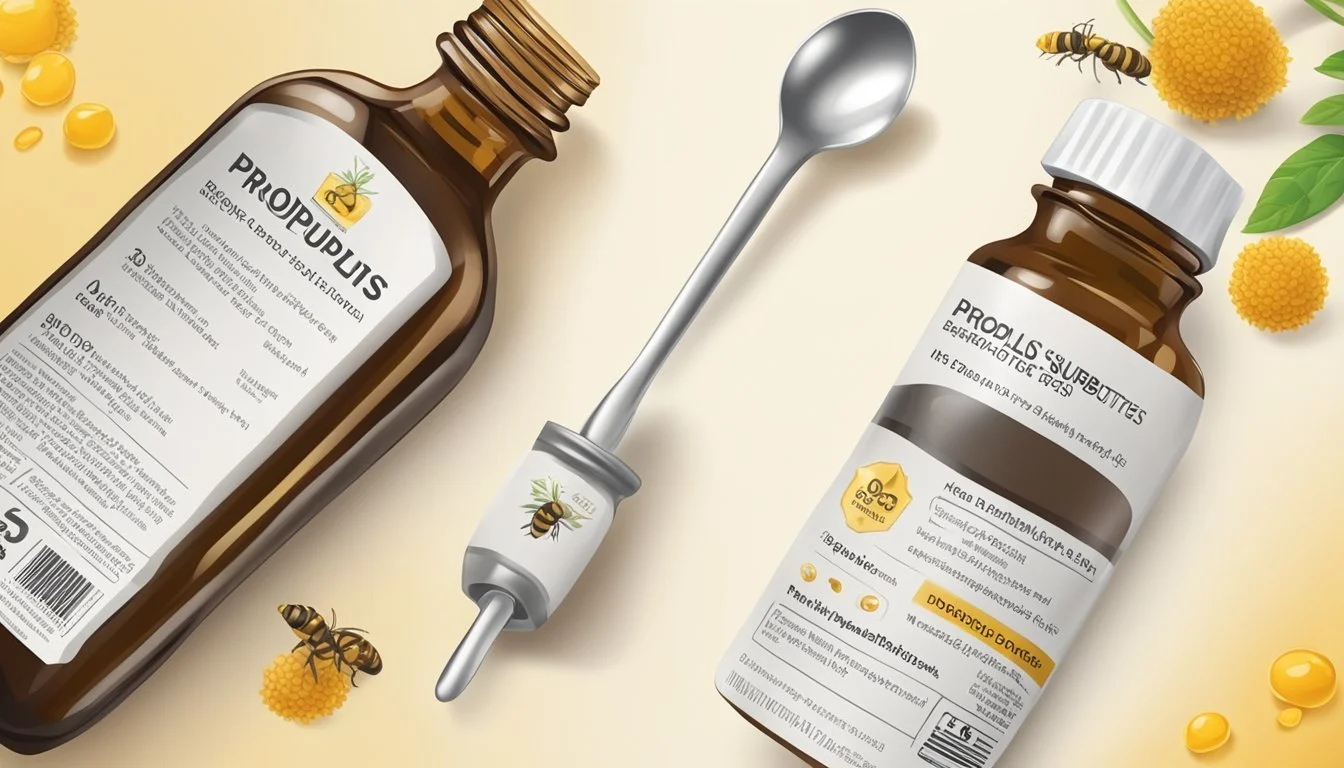Propolis Substitutes
Effective Natural Alternatives for Healing
When searching for alternatives to propolis, it's essential to understand what makes this bee byproduct so valuable. Known for its antibacterial, antiviral, and anti-inflammatory properties, propolis, or bee glue, has been utilized in various treatments ranging from wound healing to oral hygiene. Those looking for substitutes may consider other natural substances that offer similar health benefits.
For a comparable immune-boosting effect, echinacea can be a viable substitute. Echinacea is known for its ability to reduce inflammation and fight infections, mirroring some of the properties found in propolis. Additionally, honey, particularly Manuka honey, has powerful antimicrobial properties and can also benefit various skin conditions and minor wounds.
Tea tree oil is another alternative, boasting strong antifungal and antibacterial qualities. It has been widely used in skincare to treat acne, similar to propolis’s ability to combat such issues. These substitutes may provide comparable results, allowing you to enjoy the benefits of propolis even when it's not available.
Propolis Overview
Propolis, a resinous substance produced by honeybees, has a rich history and significant role in various fields due to its chemical makeup and therapeutic properties.
Definition and Origin
Propolis comes from two Greek words, "pro" (for or in defense of) and "polis" (city). It refers to a substance "in defense of the city," symbolizing its protective role in the beehive. Honeybees collect resins from tree buds, plants, and saps and mix these with beeswax and their own enzymes to create propolis. This substance safeguards the hive from bacteria, fungi, and other microbial threats.
Chemical Composition
Propolis is a complex mixture comprising over 300 identified compounds. The primary components include resins and waxes (up to 50%), essential oils (10-15%), and pollen (5%). Polyphenols such as flavonoids and phenolic compounds are abundant. These bioactive compounds give propolis its antioxidant, antibacterial, and anti-inflammatory properties. Additionally, propolis contains vitamins, minerals, fatty acids, and antioxidants which contribute to its broad-spectrum health benefits.
Types of Propolis
There are various types of propolis, derived from different species of bees and regional flora. The most common is A. mellifera propolis, produced by the European honeybee. Another type is stingless bee propolis, noted for its unique therapeutic potentials. Differences in plant sources lead to varying compositions and colorations, ranging from dark brown to green. Variations in bioactive compounds contribute to specific health effects, making each type of propolis unique in its potential applications.
By understanding its definition, chemical makeup, and different types, one gains a comprehensive view of propolis and its significance.
Health Benefits
Propolis is known for its wide range of health benefits, providing support for immune health, wound healing, infection prevention, and more. This section delves into the specific benefits including its antioxidant, anti-inflammatory, and antimicrobial properties, as well as its role in dental and cardiovascular health, and its potential in cancer prevention.
Antioxidant Properties
Propolis contains a high concentration of polyphenols such as flavonoids, known for their antioxidant capacity. These antioxidants help neutralize free radicals, preventing cellular damage and reducing oxidative stress. This protection is crucial for cellular health and can slow the aging process and potentially reduce the risk of chronic diseases such as heart disease and cancer.
Anti-Inflammatory Effects
Propolis has demonstrated significant anti-inflammatory effects due to its rich content of flavonoids and polyphenols. These compounds inhibit the production of pro-inflammatory cytokines, reducing inflammation and supporting conditions like arthritis. The anti-inflammatory properties are critical for easing symptoms of various inflammatory diseases and promoting general well-being.
Antimicrobial Activity
With natural antibacterial, antiviral, and antifungal properties, propolis is effective against a variety of pathogens. It inhibits the growth of harmful bacteria, viruses, and fungi, making it valuable for preventing infections. This antimicrobial activity is beneficial for wound healing and protection against common infections.
Dental Health Enhancements
Propolis is beneficial for oral health, helping to prevent dental caries and periodontal disease. Its antibacterial and anti-inflammatory properties make it effective in reducing oral bacteria and inflammation. Propolis-based products like toothpaste and mouthwash can improve gum health, reduce plaque formation, and promote overall dental hygiene.
Cancer Prevention and Support
Studies suggest that propolis may have anti-cancer properties due to its ability to inhibit cancer cell proliferation and induce apoptosis, or programmed cell death, in tumor cells. The flavonoids in propolis may also prevent the growth of new blood vessels that supply tumors. These properties highlight its potential in supporting cancer treatments.
Cardiovascular Health
Propolis contributes to cardiovascular health by reducing oxidative stress and inflammation, major risk factors for heart disease. Its ability to lower blood pressure and improve circulation supports heart function and overall vascular health. This protective role is vital in managing and preventing cardiovascular diseases.
By offering a broad range of health benefits, propolis serves as a potent natural supplement in various therapeutic areas, from daily wellness support to specific medical conditions.
Propolis in Medicine
Propolis has shown significant potential in medical applications, demonstrating its antibacterial, antiviral, antifungal, anti-inflammatory, and immune-supporting properties. Clinical trials and studies have explored its benefits extensively, highlighting its neuroprotective benefits and managing associated allergies and side effects.
Clinical Trials and Studies
Propolis has been investigated in numerous clinical trials for its effectiveness in treating various conditions. These studies have focused on its antimicrobial, anti-inflammatory, and antioxidant properties. For example, controlled trials reveal its ability to fight against microbial infections, while animal studies highlight its potential in reducing inflammation and scavenging free radicals. Research also indicates that propolis can aid in managing chronic conditions such as diabetes by improving glycemic control.
Neuroprotective Benefits
Emerging research suggests that propolis may offer neuroprotective benefits. Studies demonstrate its potential in protecting neurons from oxidative stress and inflammation. This makes propolis a promising candidate for managing neurodegenerative diseases such as Alzheimer's and Parkinson's. The polyphenols and flavonoids found in propolis play a crucial role in mitigating neuronal damage and promoting overall brain health.
Allergy and Side Effects Management
While propolis has many benefits, it can also cause allergic reactions in some individuals. Symptoms may include skin irritation, respiratory issues, and even anaphylaxis in severe cases. Managing these side effects is crucial for safe usage. Healthcare professionals recommend patch tests before using propolis-based products. Additionally, awareness and education about these potential risks can help prevent adverse reactions.
By focusing on clinical trials, neuroprotective benefits, and allergy management, this section provides a comprehensive overview of propolis in medicine.
Propolis in Skincare
Propolis, a resinous substance produced by bees, has been gaining popularity due to its diverse benefits for the skin. It is known for its moisturizing properties, ability to treat wounds, and its use in various cosmetic applications.
Benefits for the Skin
Propolis is recognized for its hydrating ability without clogging pores. This makes it ideal for individuals with oily and acne-prone skin. Its anti-inflammatory properties help reduce redness and swelling, soothing irritated skin.
Additionally, propolis has antioxidant effects that combat free radicals, thereby supporting anti-aging efforts. Its composition includes flavonoids and phenolic compounds which contribute to skin health and vitality.
Wound Treatment
For wound treatment, propolis acts as a natural antiseptic. It has antibacterial properties that help in preventing infections and promoting faster wound healing.
Studies show that propolis can aid in the treatment of minor cuts, burns, and non-healing wounds. It forms a protective barrier over wounds, which helps in reducing inflammation and promoting tissue regeneration.
Propolis creams and ointments are commonly used to take advantage of these healing benefits, offering a natural alternative to traditional pharmaceutical treatments.
Cosmetic Applications
In the realm of cosmetics, propolis is utilized in various products such as facial masks, serums, and creams. A popular method involves mixing propolis with honey and royal jelly to create moisturizing masks that enhance skin texture and hydration.
Propolis creams have gained attention for their ability to moisturize without causing breakouts. These creams are suitable for sensitive skin due to their gentle nature and effectiveness in enhancing skin health.
Products containing propolis are often loved for their lightweight texture and the added benefit of skin protection, making them a staple in many skincare routines.
Usage and Dosage
Individuals opting for propolis substitutes should consider the form the supplement takes, the correct dosage, and be aware of any potential drug interactions or contraindications.
Supplement Forms
Propolis and its substitutes come in various forms, including capsules, tablets, tinctures, and creams. Capsules and tablets are easy to consume and offer precise dosages. Tinctures, or liquid extracts, can be mixed with water or other beverages. Creams and ointments are applied directly to the skin for topical benefits, such as wound healing. Each form has its advantages and specific use cases, so users should select the supplement type that best fits their needs.
Appropriate Dosage
The appropriate dosage of propolis substitutes depends on the specific supplement and its intended use. For capsules and tablets, a common dosage ranges from 300 to 500 mg per day, taken with meals to enhance absorption. Tinctures often recommend a dosage of 10-30 drops mixed in water, taken once or twice daily. For topical applications, the amount applied can vary based on the product's concentration and the area being treated. Always follow the manufacturer's recommended dosage guidelines and consult with a healthcare provider.
Drug Interactions and Contraindications
When taking propolis substitutes, it is crucial to be aware of potential drug interactions. These supplements can interact with antibiotics, reducing their effectiveness. They may also affect medications that influence blood clotting, such as warfarin. Individuals with allergies, especially those related to bee products, should exercise caution. Contraindications include known allergies to propolis or similar bee products, and they should consult with a healthcare provider before use.
Propolis in Nutrition and Food Products
Propolis, a natural resinous compound produced by bees, has increasingly found its way into various food products and dietary supplements due to its recognized health benefits. It is valued for its antioxidant, antimicrobial, and anti-inflammatory properties.
Propolis-Enriched Foods
Propolis is now an ingredient in a diverse range of food products. It can be found in honey, enhancing its nutritional profile with additional vitamins, minerals, and polyphenols. Propolis-enriched honey is especially popular for its immune-boosting qualities.
Beyond honey, propolis is added to chocolates, baked goods, and beverages. These products leverage propolis for its health benefits without compromising taste. For instance, propolis-infused teas and juices provide a nutritional boost, combining flavor with functional benefits.
Manufacturers often target consumers looking for natural alternatives to synthetic additives. This trend highlights a growing interest in functional foods that merge wellness and convenience.
Dietary Supplements
Propolis is widely available in the form of dietary supplements. These include capsules, tablets, and tinctures, often standardized for their active compounds such as flavonoids. Supplements provide a concentrated and convenient way to incorporate propolis into the diet.
Supplements may promote immune health, improve skin conditions, and support overall well-being. They are used by individuals seeking to enhance their nutrient intake with natural products.
Quality and dosage are important considerations. Consumers should look for supplements from reputable brands that ensure purity and effectiveness. Consulting with a healthcare professional is advised before beginning any new supplement regimen, especially for those with pre-existing medical conditions.
Legal and Regulatory Aspects
In the realm of substitutes for propolis, understanding the legal and regulatory frameworks is crucial. These frameworks ensure safety, quality, and effectiveness, often involving agencies like the FDA and NSF. A clear grasp of these aspects helps validate the use of alternative substances.
FDA and NSF Regulation
The Food and Drug Administration (FDA) plays a central role in regulating substances that can be used as propolis substitutes. This includes ensuring that these products meet safety and efficacy standards before they can be marketed. The FDA requires that manufacturers adhere to Good Manufacturing Practices (GMP) and that all health claims are substantiated with evidence.
The National Sanitation Foundation (NSF) also sets standards for dietary supplements and ingredients. They certify products that meet rigorous testing for contaminants, quality, and purity. Certification by NSF can be seen as a mark of reliability, ensuring that substitutes for propolis meet high standards.
Key Points:
FDA ensures safety and efficacy.
FDA requires GMP compliance.
NSF certification guarantees quality and purity.
Quality Control and Certification
Quality control is essential for any propolis substitute to be considered safe and effective. This involves stringent testing for contaminants, consistent product composition, and reliable manufacturing processes.
Certifications play a vital role in this process. Products certified by NSF or other recognized bodies undergo rigorous testing to verify their quality. Certification can include tests for microbial contamination, heavy metals, and pesticide residues. Such standards help in building consumer trust and ensuring regulatory compliance.
Main Aspects:
Strict testing for contaminants.
Reliable composition and manufacturing.
NSF and other certifications build credibility.
Environmental and Ethical Considerations
Propolis substitutes must consider both environmental sustainability and ethical implications. Key areas of focus include sustainable sourcing practices and the impact on bee populations.
Sustainable Sourcing of Propolis
Sustainable sourcing of propolis demands attention to the preservation of natural habitats and minimizing deforestation.
When sourcing from plants and trees, it is crucial to ensure that the harvesting process does not damage ecosystems. Selecting raw materials with similar physicochemical properties to conventional ingredients can help in this regard. The goal is to reduce the environmental footprint by opting for renewable and less intrusive methods.
Moreover, sourcing propolis responsibly includes maintaining biodiversity. Farmers and producers need to implement practices that do not exploit or deplete local flora.
Impact on Bee Populations
The impact on bee populations is a significant concern when considering propolis substitutes. Bees play an essential role in pollination, which is critical for food production and maintaining biodiversity.
Overharvesting propolis can weaken bee colonies, negatively affecting their health and productivity. It is vital to adopt practices that protect bee habitats and avoid excessive collection. Supporting stingless bee populations, such as those from the Meliponini tribe, also offers a sustainable alternative.
Ensuring the well-being of bees requires an understanding of their natural behaviors and needs. Implementing bee-friendly practices, such as providing diverse foraging options and reducing pesticide use, helps sustain healthy bee populations.
Historical Uses of Propolis
Propolis has been used for various medicinal and protective purposes through different periods in history. This section covers its utilization in ancient civilizations and its revival and development in more recent times.
Ancient Cultures
The ancient Egyptians were among the first to recognize and utilize the beneficial properties of propolis. They employed it in the mummification process due to its preservative qualities. Propolis was also used in their traditional medicine for healing wounds and treating infections.
Greek and Roman civilizations also made extensive use of propolis. The ancient Greeks recognized its ability to improve health and used it to treat abscesses. The Romans documented its use in treating sores and ulcers. For these cultures, propolis was more than just a simple substance—it was integral to their approach to medicine.
Modern Developments
Interest in propolis waned during the Middle Ages but saw a revival during the Renaissance. Medical humanists reintroduced ancient remedies, leading to renewed use of propolis in Europe.
In more recent times, research has focused on the chemical properties and pharmacological applications of propolis. Studies have confirmed its effectiveness as an antimicrobial and anti-inflammatory agent. The modern practice has also seen the exploration of propolis from different bee species, such as stingless bees, highlighting its versatility and broadening potential applications in human health.









